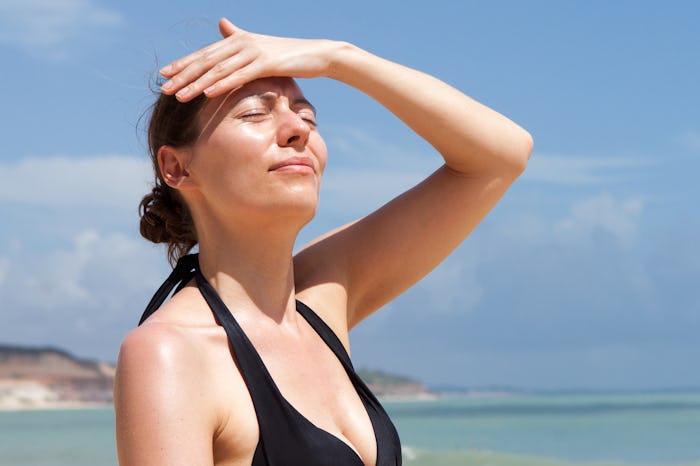Life

5 Signs Of Sun Poisoning, Since It's Not The Same Thing As Sunburn
With summertime in full swing, it's more important than ever to be cautious when you or your kids spend time outside. Aside from bug bites, cuts and scrapes, water related dangers, and all the other summertime "hazards," there is one potential danger that never really goes away — well, except at night. Spending prolonged time in the sun without proper protection can be dangerous, and not just because of the potential of sunburn. Sun poisoning is another summer hazard that many people aren't aware of. However, there are some easily recognizable signs of sun poisoning that distinguish the sickness from a regular sunburn to make it easier for parents, or frequent sun-goers, to spot.
According to Mayo Clinic, though there are several different types of sun poisoning, the most common variation is called polymorphic light eruption, or simply sun allergy. This type of sun poisoning is easily treatable, and usually disappears on its own. But in certain cases, medical attention may be required.
Though it’s easy to confuse with a sunburn, the two are actually very different, and if not treated properly, have very different consequences. Knowing the signs can save you (or a loved one) from a painful encounter with the sun and help you know what to do to stay safe next time.
1Red Skin
According to Mayo Clinic, this is the symptom most easily confused with sunburn. However, in cases of sun poisoning, the redness will develop into something more — though the initial redness will be the first recognizable sign.
2Hive-Like Blisters
According to Hives.org, if you regularly break out in hives or small raised bumps after brief or prolonged sun exposure, you have a type of sun poisoning called solar urticaria. The same article states that the symptoms of hives are itchy bumps, bright red skin that may be hot to the touch, and occasional swollenness.
3Itchiness
Although itchiness is sometimes accompanied by hives, it can be present on its own. The rash will be itchy, according to New Health Guide, and uncomfortable and can usually be lessened with calamine lotion or other at home remedies.
4Scaling Or Bleeding
Mayo Clinic states that scaling, scabs or bleeding may occur in the area where the sun exposure is worst. This may be a result of scratching or can occur on its own as the blisters heal.
5 Fever, Chills, or Nausea
If fever, chills, nausea, dizziness, or fainting occur, see a doctor immediately, according to Medicine Net. These are symptoms also associated with heat or sunstroke and need emergency attention.